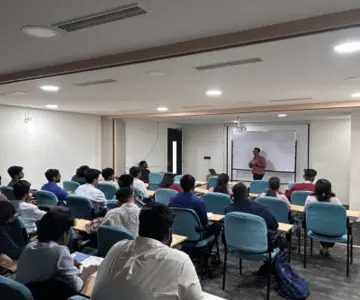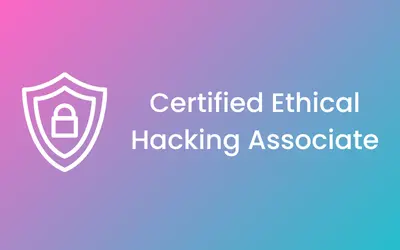- Real-World Attacks: Training is structured around how real cyberattacks occur, teaching learners to break into systems ethically, understand attacker logic, and secure vulnerabilities before they are exploited.
- Ethical Mindset: The course builds a strong ethical hacking mindset, ensuring learners understand legal boundaries, responsible disclosure, and professional conduct while performing security testing activities.
- Tool Mastery: Students learn to use ethical hacking tools through guided practice, gaining confidence in scanning, exploitation, and reporting techniques commonly used in penetration testing engagements.
- Attack Simulation: Learners participate in controlled hacking simulations that replicate enterprise environments, helping them understand how attackers move within networks and how to stop intrusions effectively.
- Skill Progression: The training follows a structured learning path, starting from basic hacking concepts and advancing toward complex penetration testing and vulnerability analysis techniques.
- Expert Guidance: Instructors actively guide learners during hacking exercises, sharing practical insights from real penetration testing work rather than relying only on theoretical explanations.
- Career Alignment: The course is aligned with job roles in ethical hacking, ensuring learners develop skills directly applicable to penetration testing, security auditing, and vulnerability assessment positions.
- Practical Assessment: Learners are evaluated through hands-on hacking tasks instead of exams alone, ensuring their ability to identify, exploit, and document security weaknesses accurately.
- Industry Exposure: Students gain exposure to how ethical hacking is performed in professional environments, including reporting findings, risk analysis, and recommending security improvements.
- Continuous Support: Skillfloor provides ongoing learning support throughout the training, helping learners overcome challenges during labs and strengthen their ethical hacking capabilities consistently.
Why Ethical Hacking Training in Bangalore
Bangalore is widely recognized as India’s IT and technology hub, hosting hundreds of tech companies, startups, and global enterprises. With the city’s growing reliance on digital infrastructure, the risk of cyber attacks and data breaches has increased significantly. Organizations across industries from IT services and finance to e-commerce, actively seek skilled ethical hackers to protect sensitive information, secure networks, and mitigate security vulnerabilities. By enrolling in Ethical Hacking training in Bangalore, learners position themselves at the heart of this demand, gaining exposure to real-world cybersecurity challenges and emerging threats in a fast-paced tech environment.
Skillfloor’s Ethical Hacking program in Bangalore focuses on practical, hands-on learning designed to replicate real-world scenarios. Learners gain expertise in key areas such as network security testing, web application penetration testing, cloud security auditing, vulnerability assessment, privilege escalation, and social engineering simulations. The program also trains students on industry-standard tools and frameworks used by professional ethical hackers, ensuring that every student develops both the technical skills and strategic thinking required to identify and address security gaps effectively. Live labs, simulated attacks, and project-based learning ensure students are job-ready from day one.
In addition to technical skills, Skillfloor’s training emphasizes career growth and industry relevance. Learners benefit from mentorship, placement support, and exposure to networking opportunities with top cybersecurity professionals in Bangalore. Completing the program and earning Skillfloor’s recognized ethical hacking certification enhances professional credibility and improves employability in roles such as Ethical Hacker, Penetration Tester, Security Analyst, and Red Team Specialist. With the growing importance of cybersecurity in every industry, pursuing Ethical Hacking training in Bangalore equips learners with both the knowledge and confidence to excel in high-demand, future-ready careers.
Career Opportunities After Completing an Ethical Hacking Course
Completing an Ethical hacking course opens the door to a wide range of cybersecurity career paths. As organizations increasingly rely on digital systems, the need for professionals who can identify, test, and secure vulnerabilities has become critical across industries such as IT, finance, healthcare, and e-commerce. Ethical hacking skills allow professionals to think like attackers while working to protect systems and sensitive data.
- Ethical Hacker / White Hat Hacker: Identify security loopholes by simulating real-world attacks and help organizations strengthen defenses before threats are exploited.
- Penetration Tester: Conduct authorized testing on networks and applications to uncover weaknesses and recommend effective remediation solutions.
- Cyber Security Analyst: Monitor systems, investigate security incidents, and implement preventive controls to reduce cyber risk and data breaches.
- SOC Analyst: Manage real-time threat detection, incident response, and continuous security monitoring within security operations centers.
- Vulnerability Assessment Specialist: Scan systems for known vulnerabilities, assess risk levels, and support teams in prioritizing security fixes.
- Network Security Engineer: Design and maintain secure network infrastructures, ensuring safe data flow and protection against unauthorized access.
- Application Security Tester: Test web and mobile applications for common security flaws such as injection attacks and authentication vulnerabilities.
- Cyber Security Consultant: Advise organizations on security strategies, compliance requirements, and risk mitigation practices.
- Freelance Ethical Hacker / Bug Bounty Hunter: Work independently on security projects or bug bounty programs by responsibly reporting discovered vulnerabilities.
- Information Security Manager (with experience): Oversee security teams, develop policies, and manage enterprise-level cybersecurity initiatives.
Overall, an ethical hacking course builds a strong foundation for long-term growth in cybersecurity. With hands-on skills, tool expertise, and practical knowledge, professionals can pursue diverse roles, advance into leadership positions, or explore independent opportunities.
Why Choose Skillfloor for Ethical Hacking
Choosing the right training provider is essential when building a strong foundation in ethical hacking, and Skillfloor stands out as a trusted choice for learners aiming to enter the cybersecurity domain with confidence. Skillfloor’s Ethical Hacking training combines practical, hands-on experience with a curriculum that mirrors real-world security challenges faced by organizations today. Instead of focusing solely on theory, the program emphasizes active engagement with tools, techniques, and simulated attack scenarios that ethical hackers encounter in professional environments. This approach helps learners build both technical expertise and strategic thinking, making them job-ready from day one.
Skillfloor’s trainers bring industry experience and practical insights gained from real penetration testing, vulnerability assessments, and cybersecurity projects. Their guidance helps simplify complex ethical hacking concepts and provides valuable context on how security breaches occur and how they can be prevented. Learners benefit from one-on-one support, doubt resolution sessions, and mentorship that accelerates skill development while ensuring clarity at every step. This personalized touch makes the learning process engaging, effective, and tailored to individual growth.
In addition to technical training, Skillfloor offers comprehensive career support that keeps learners competitive in the job market. The program prepares students for industry-recognized ethical hacking certifications, enhancing credibility with employers and improving placement opportunities in roles such as Ethical Hacker, Penetration Tester, Security Analyst, and Vulnerability Assessment Specialist. With its focus on practical skills, expert instruction, and career-focused outcomes, Skillfloor provides a complete learning experience that empowers learners to succeed in the evolving field of ethical hacking.
Ethical Hacking Career and Placement Support at Skillfloor
Skillfloor’s Ethical Hacking program is designed not only to build strong technical skills but also to support learners in launching and growing successful cybersecurity careers. The placement and career support framework focuses on making learners industry-ready by combining practical ethical hacking expertise with career-oriented guidance tailored to current hiring requirements.
- Role-Focused Training: Skillfloor prepares learners specifically for ethical hacking roles such as Ethical Hacker, Penetration Tester, Security Analyst, and Vulnerability Assessment Specialist through targeted, job-aligned skill development.
- Hands-On Project Experience: Learners work on real-world ethical hacking labs, attack simulations, and security testing projects that strengthen practical expertise and add value to professional profiles.
- Certification Readiness: The program supports preparation for recognized ethical hacking and cybersecurity certifications, helping learners improve credibility and stand out in competitive job markets.
- Resume and Profile Building: Skillfloor assists learners in creating ethical hacking-focused resumes that highlight tools, techniques, labs, and penetration testing experience valued by employers.
- Interview Preparation: Dedicated interview sessions cover technical and ethical hacking questions, real-world scenarios, and problem-solving approaches commonly used in cybersecurity hiring processes.
- Placement Assistance: Learners receive structured support for job applications, internships, and entry-level ethical hacking roles across cybersecurity teams and IT organizations.
- Industry Exposure: Skillfloor provides access to industry insights, professional interactions, and hiring trends, helping learners understand workplace expectations in ethical hacking roles.
- Career Growth Guidance: Continuous mentorship helps learners plan long-term career progression from entry-level ethical hacking roles to advanced positions such as Red Team Specialist or Security Consultant.
With a balanced focus on technical mastery and career development, Skillfloor ensures learners are not only skilled ethical hackers but also well-prepared to secure meaningful roles in the cybersecurity industry. This structured support system helps learners achieve sustainable career growth and long-term success in ethical hacking.
Ethical Hacking Course Fees at Skillfloor
Understanding the Ethical Hacking course fees at Skillfloor is an important step in planning a successful cybersecurity career. Skillfloor offers a transparent and value-driven fee of ₹14,900, designed to make high-quality ethical hacking training accessible while ensuring comprehensive learning and practical exposure. This fee covers the full curriculum, including core modules on penetration testing, network security, web application security, vulnerability assessment, and real-world attack simulations. Learners also gain access to hands-on labs, industry-standard tools, and live practice environments essential for building practical ethical hacking skills.
The ₹14,900 course fee includes expert-led instruction, live hacking simulations, mentorship support, and preparation for industry-recognized certifications, ensuring learners are ready for professional cybersecurity roles. Flexible payment options and installment plans are also available to help students and working professionals manage the cost effectively. This approach ensures that learners receive maximum value, focusing on skill acquisition, practical knowledge, and career preparation rather than just affordability.
Investing ₹14,900 in Skillfloor’s ethical hacking training is more than a course cost—it is an investment in a high-demand, future-ready career. With the growing need for ethical hackers and strong salary potential in the cybersecurity industry, this fee reflects not only the comprehensive training and hands-on exposure but also the long-term career value. Graduates are equipped to pursue roles such as Ethical Hacker, Penetration Tester, Security Analyst, and Vulnerability Assessment Specialist with confidence and industry-ready skills.
Ethical Hacking Tools and Technologies
Ethical hacking depends on specialized tools and technologies that help security professionals identify vulnerabilities, test system defenses, and strengthen digital infrastructure. During ethical hacking training, learners work with industry-standard tools used for reconnaissance, scanning, exploitation, and reporting. These tools allow ethical hackers to simulate real attack scenarios in a legal and controlled environment, helping organizations detect and fix security weaknesses before they are exploited.
|
Tool / Technology
|
Category
|
Purpose in Ethical Hacking
|
|
Nmap
|
Network Scanning
|
Identifies live hosts, open ports, and running services within a network
|
|
Metasploit Framework
|
Exploitation
|
Executes controlled exploits to validate system and application vulnerabilities
|
|
Burp Suite
|
Web Security Testing
|
Detects web application flaws such as SQL injection and cross-site scripting
|
|
Wireshark
|
Traffic Analysis
|
Captures and analyzes network packets to identify suspicious activity
|
|
Nessus
|
Vulnerability Assessment
|
Scans systems to detect configuration issues and known security weaknesses
|
|
John the Ripper
|
Password Testing
|
Tests password strength and identifies weak authentication mechanisms
|
|
Aircrack-ng
|
Wireless Security
|
Evaluates wireless network encryption and access control vulnerabilities
|
|
OSINT Tools
|
Reconnaissance
|
Collects publicly available information for ethical reconnaissance activities
|
By gaining hands-on experience with these tools, learners understand not only how to use them but also how to follow proper ethical hacking methodologies. Training emphasizes responsible usage, legal authorization, and clear documentation of findings. Mastery of ethical hacking tools and technologies equips learners to perform effective penetration testing, improve security posture, and pursue professional roles in cybersecurity and ethical hacking with confidence.
Ethical Hacking as a Core Pillar of Modern Cyber Defense
Ethical hacking has evolved into a strategic function within modern organizations, going far beyond basic system testing. As digital platforms, cloud environments, and online transactions continue to grow, businesses face constant exposure to cyber threats. An ethical hacking course trains professionals to proactively identify vulnerabilities in networks, applications, and systems before they can be exploited. This preventive approach helps organizations strengthen their security posture and reduce the risk of costly cyber incidents.
Through structured training and hands-on practice, learners gain practical experience with real-world attack techniques, security testing methodologies, and industry-standard tools. Ethical hackers learn how to simulate attacks, analyze security gaps, and recommend effective countermeasures. This practical exposure ensures that professionals are not only technically capable but also able to apply their skills in real enterprise environments, making them valuable assets to security teams.
From a career perspective, ethical hacking offers long-term relevance and growth across multiple industries, including IT services, finance, healthcare, e-commerce, and government sectors. Organizations increasingly rely on ethical hackers to meet compliance requirements, protect sensitive data, and maintain customer trust. With continuous advancements in technology and cyber threats, ethical hacking remains a future-ready profession that supports stable career progression, skill advancement, and meaningful impact in the cybersecurity domain.


























